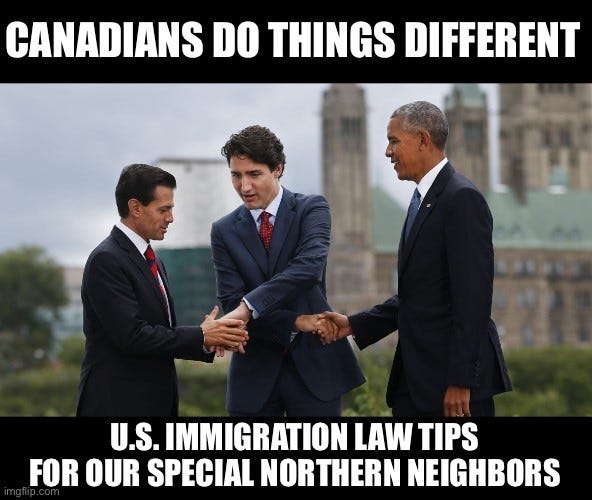U.S. Immigration Law Tips for Canadians
The United States gives many special privileges to our northern neighbors but alas, they still need long form birth certificates to get a green card.
Canadians are “special.” If you have met one, then you know this.
This post is an extremely non-comprehensive list of ways in which Canadian citizens get special privileges in U.S. immigration law.
No Visa Stamping generally required.
Unlike pretty much every other nationality, citizens of Canada are generally exempt from the requirement to obtain a travel visa at a U.S. consulate prior to entering the United States. There are a couple notable exceptions for “E” investor visas and “K-1” fiance visas (and a few less common categories), but for nearly all visa categories, there is no visa stamp required if you have a valid Canadian passport.
In lieu of a visa stamp, U.S. Customs officers will accept a valid Canadian passport and a smile.
More can be found here on this subject.
Visitor admission = 6 months.
Unlike Europeans or citizens of Japan and Australia, who enter the United States on their passports as ESTA visitors and are limited to 90 day admissions, Canadians who enter the United States as visitors on their passports alone are generally assumed to be admitted for 6 months (not 3 months).
There is an unconfirmed rumor Canadians are given 6 months’ admission (versus 3 months) because that is how long winter is in Canada and so many of them want to be in Florida for the winter.
“Canadian visitors are generally granted a stay in the U.S. for up to six months at the time of entry.”
More can be found here on this subject.
TNs at the Border.
TN (Trade NAFTA) visa status is available for citizens of Canada and candidates seeking TN status can process the visa status quickly and inexpensively at international airports in Canada or U.S./Canada land ports of entry.
The list of qualifying occupations for TN status is here.
Unlike H-1Bs, which face a very strict annual limit, there is basically no limit for TNs.
In an era where every type of U.S. immigration filing seems very expensive (and getting more expensive) and cumbersome, Canadian TNs remain a beacon of low-cost efficiency.
L-1s at the Border.
Citizens of Canada who are intracompany transferees are eligible to process their L-1 status at international airports in Canada or U.S./Canada land ports of entry.
The list of ports of entry available for “preclearance” can be found here.
H-1B without J-1 waiver “loophole.”
Normally someone who enters the United States in J-1 visa status (like a clinical physician for residency) and is subject to the Immigration Act Section 212(e) two-year home residence requirement is not able to obtain H-1B status unless he/she first gets a waiver, or goes back to the home country for 24 months to “fulfill” the home residence requirement.
Because Canadians are ‘visa-exempt’ - they are also able to be exempt from the requirement to get a J-1 waiver prior to getting an H-1B. But don’t be tricked - you will still need the J-1 waiver to get a green card.
Nexus and Commuter Green Cards.
Nexus is a program that allows for Canadians to process through U.S. Customs quicker than the traditional admissions process.
“The NEXUS program allows pre-screened travelers expedited processing when entering the United States and Canada. Program members use dedicated processing lanes at designated northern border ports of entry, NEXUS kiosks when entering Canada by air and Global Entry kiosks when entering the United States via Canadian Preclearance airports. NEXUS members also receive expedited processing at marine reporting locations.”
See more here.
Some Canadians just want to work in the United States but live in Canada. Such individuals can pursue “commuter status” which is a special status described in more detail here.
Don’t forget your long form birth certificate!
Canadian citizens born in Canada often have a card-sized document that they consider their birth certificate. And it is!
However, the “short form” birth certificate is NOT acceptable for green card processing in the United States.
“The "small" or "short form" certificate is a computer-printed, limited extract of information from provincial records. It is a wallet-sized card, 9.5 x 6.4 cm or 2.5 x 3.75in (Specimen from British Columbia). Short-form or small certificates are not acceptable for visa purposes because they do not contain enough identification information, such as parents' names.”
The U.S. Department of State does have a fairly comprehensive website which gives you information on how to obtain the right kind of LONG FORM birth certificates in all the provinces of Canada. You can find information about what is considered acceptable for green card processing here.
Visa Bulletin cut-off dates and waitlists are based on Country of Birth, not Citizenship.
Sadly, if you were born in India or China and you later become a citizen of Canada, you are ARE eligible for all the special perks mentioned above but for purposes of green card processing, you are subject still to the cut-off dates on the Visa Bulletin based on country of birth.
So someone born in India who later becomes a Canadian citizen is subject to the Indian cut-off dates and annual limits. But while he waits, he could have TN visa status as a citizen of Canada.
What did I miss? What other special perks exist for Canadian citizens?






Hi Robert thank you for this post. Please can an Asylee or the dependent who has an EAD apply for H1B?